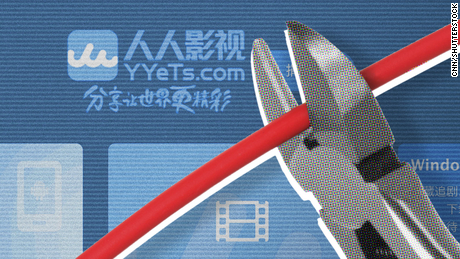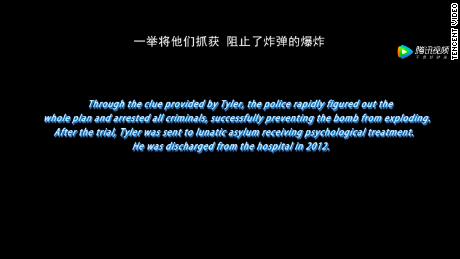A screenshot of the caption on the edited version of "Fight Club," available on Tencent Video in china.

A version of this story appeared in CNN’s Meanwhile in China newsletter, a three-times-a-week update exploring what you need to know about the country’s rise and how it impacts the world. Sign up here.
Hong Kong / Beijing (CNN Business)More than two decades after its release, “Fight Club” has been given a very different ending in China — and this time, the authorities win.
Chinese fans of David Fincher’s cult classic were enraged over the weekend when they noticed a version of the movie available on popular Chinese streaming platform Tencent Video completely removes its iconic ending.
The finale of “Fight Club” shocked audiences when the film hit theaters in 1999. In a massive twist, the narrator, played by Edward Norton, realizes that Brad Pitt’s slick-talking Tyler Durden character is his imaginary alter ego, and kills him off.
In the final scene, the narrator stands with his girlfriend, played by Helena Bonham Carter, as they watch explosives blow up a cluster of skyscrapers — all part of what was originally presented to the audience as Durden’s plan to destroy consumerism by erasing bank and debt records.
That amount of anarchy — and the government’s inability to stop it — doesn’t appear to have passed muster with China’s notoriously strict censorship rules, though.
In the version available on Tencent Video, which CNN Business was able to view on the platform, the entire scene featuring the explosions has been cut out. Instead, it has been replaced with a caption explaining to audiences that the authorities arrived just in time to save the day.
“Through the clue provided by Tyler, the police rapidly figured out the whole plan and arrested all criminals, successfully preventing the bomb from exploding,” the caption reads. “After the trial, Tyler was sent to [a] lunatic asylum receiving psychological treatment. He was discharged from the hospital in 2012.”
The new ending has infuriated some viewers. It wasn’t clear when this version of the film appeared on Tencent Video, but screenshots of the edited film gained traction in China over the weekend, as commenters complained about the drastic alteration.
“This is too ridiculous,” wrote one person on Tencent Video’s page for the movie. Another called the change “a pillar of shame in cinematic history.”
“No one wants to pay money to watch a classic that has been so ruined to such an extent,” yet another person wrote on Douban, a movie review site.
Tencent declined to comment about the edit. CNN Business also reached out to the Cyberspace Administration of China, the internet regulator that oversees streaming platforms, as well as the China Film Administration, but neither government agency responded to a request for comment.
While it’s unclear how or when the edit was made, it’s not uncommon for foreign movies to undergo heavy censorship before finding a legitimate broadcast home in China. And the Chinese companies that hold the rights to international films in the country often self-censor to appease regulators before general releases.
According to the version of the film available on Tencent Video, the Chinese publisher of “Fight Club” is Pacific Audio & Video Co., a company based in the city of Guangzhou. It’s affiliated with state-owned Guangdong Radio and Television.
A Pacific Audio & Video employee told CNN Business that she could not comment about the movie’s streaming release. She did say, however, that the company no longer owned the rights to the movie’s DVD release in the country, which it obtained more than a decade ago.
This isn’t the first time Chinese audiences have been able to watch “Fight Club” legitimately in the country. The movie was shown at the Shanghai International Film Festival in 2006 — an event that Norton and other Hollywood stars even attended — according to Chinese media reports at the time.
That same festival screened the movie again in 2017. The China Film Archive in Beijing has also held screenings, according to Chinese media.
CNN Business did not attend those events, and so can not verify whether those screenings were edited. However, one Douban commenter who wrote about her experience watching the movie at the Shanghai International Film Festival in 2017 remarked about the “much anticipated ending,” including the collapsing buildings.
Film censorship has a long history in China.
Since the early 1990s, authorities have allowed just a few dozen foreign films to be screened in the country each year — only nine of the 26 Oscar best picture winners were screened publicly in China from 1994 to 2019, for example.
Movies or shows with controversial themes — such as those that purportedly depict China in a bad light, portray taboo subjects like the 1989 Tiananmen Massacre, or feature LGBTQ storylines — are kept out entirely. And since China lacks a film rating system, any content approved by Chinese regulators is heavily edited to remove certain scenes, such as graphic sex or violence.
When the Oscar-winning Freddie Mercury biopic “Bohemian Rhapsody” was released in China in 2019, for example, any mention of the Queen singer’s sexuality — as well as his AIDS diagnosis — was edited out.
And the American blockbuster fantasy drama “Game of Thrones,” which built its popularity on graphic sex and violence, was censored so heavily on Tencent Video that some viewers complained that it was turned into a staid “medieval European castle documentary.”
Source: Read Full Article


